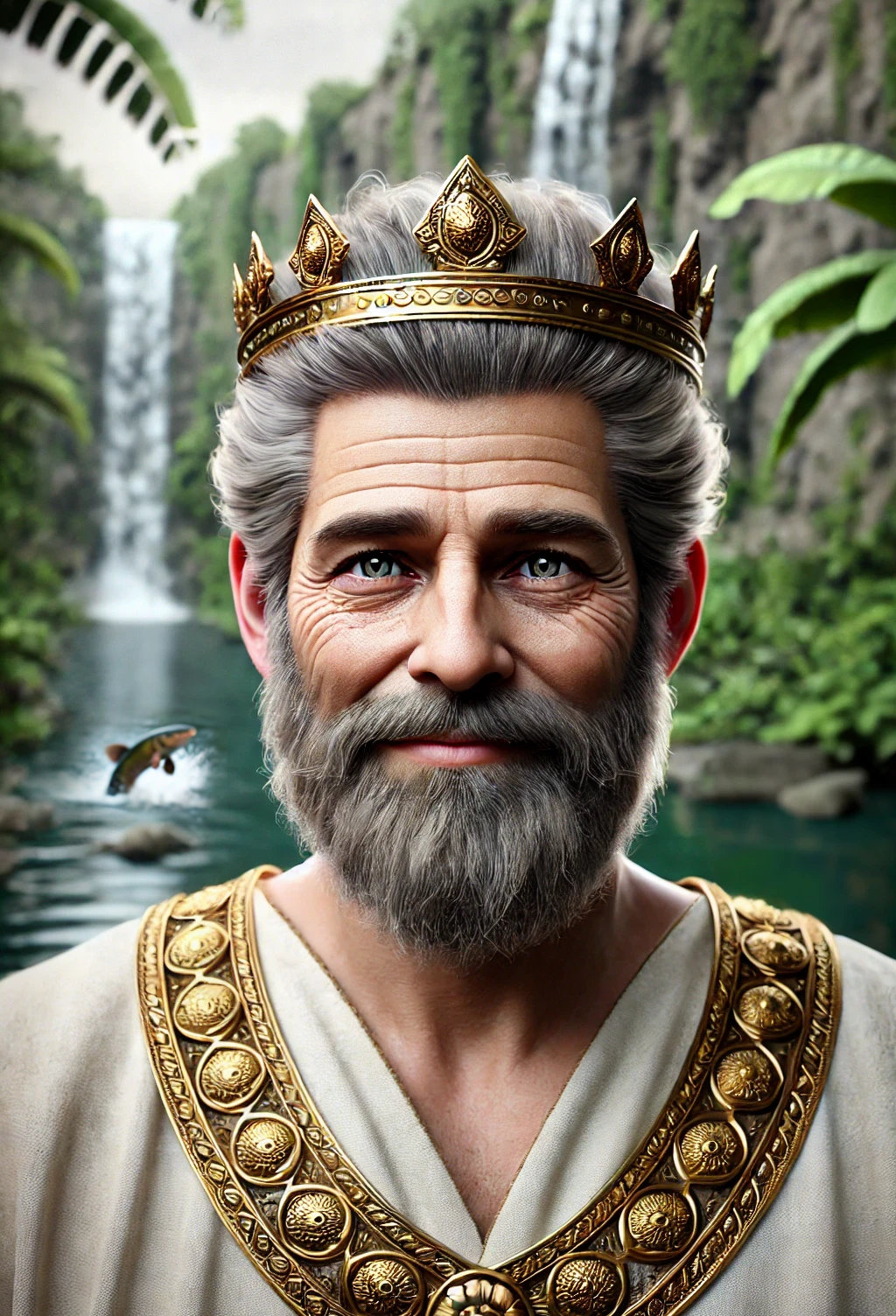Enki is one of the most important gods in the Sumerian pantheon. He is the god of wisdom, fresh water, craftsmanship, magic and creation.

Enki is one of the most important gods in the Sumerian pantheon. He is the god of wisdom, fresh water, craftsmanship, magic and creation.

 Enki's Appearance
Enki's AppearanceEnki is often depicted as a bearded man. Since Enki and Enlil are both sons of An, they are about the same age. As Enlil is often seen as the god who takes over after An, Enki is probably slightly younger than his brother. It would therefore make sense to depict him at the age of 60. Enki often wears long robes that emphasize his divine role. A particularly striking feature in historical depictions of Enki are streams of water flowing from his shoulders. These symbolize his dominion over the fresh waters and his role as the source of all life.
 Enki's Personality
Enki's PersonalityEnki can be characterized as benevolent, wise and mischievous. His wisdom makes him an advisor and helper to gods and humans with whom he willingly shares his knowledge and resources. In doing so, he pursues the goal of promoting the development of human civilization and creating prosperity.
Enki also shows a mischievous and cunning side. His cleverness enables him to overcome challenges. He is known for his ability to solve problems in unconventional ways and to defuse conflicts through cunning and diplomacy.
 Enki's Duties as a God
Enki's Duties as a GodEnki rules over the Abzu, the underground freshwater reservoir. He is responsible for all sources of fresh water, including rivers, lakes and wells. Through his control over water, Enki ensures the fertility of the earth and the flourishing of plants and animals. Since there is no life without water, he plays a crucial role in the creation and preservation of life.
Enki acts as an advisor to the gods and a teacher to mankind, spreading knowledge and civilization. In particular, Enki is the advisor to Enlil, the head of the Anunnaki in Sumer. Enki often uses magical powers to solve divine and human problems. For example, in the myth Inanna's Descent to the Netherworld, he uses magic to bring the goddess Inanna back from the dead.
He often appears as the protector of mankind, helps to consolidate the land after natural disasters and distributes the tasks of the lesser gods so that they are of the greatest benefit to the prosperity of human civilization.
 The Career of Enki
The Career of EnkiEnki's father An was initially together with Ninhursag and fathered his half-brother Enlil with her. Enlil caused the separation of the sky god An and the earth goddess Ninhursag, whereupon the sky also separated from the earth and the earth as we know it came into being. However, the earth was a wasteland at the time as it lacked fresh water. Soon afterwards (possibly before), An fathered his second son Enki, the god of fresh water, together with Nammu.
Enki fell in love with Ninhursag and gave her the water she lacked to make the earth fertile. This is described in the myth Enki and Ninhursag. Together with Enki, Ninhursag transformed the land of Dilmun into a paradise-like region. The two then made Sumer fertile and created humans, who were not particularly intelligent at first.
The Epic of Atrahasis describes how Enlil initially commissioned the Igigi to found human civilization. However, it soon became clear that humans were not intelligent enough to support the Igigi in building civilization. Therefore, Enki, the god of wisdom, together with Nihnursag, decided to give the humans intelligence.
The gods then began to commission the construction of cities and the erection of the first temples. One of the first cities was the city of Eridu, which was founded around 5400 BCE. Enki became the god of this city and had his temple E-abzu built in Eridu, near the Euphrates.
In the myth Enki and Ereshkigal, it is described that Enki visited the netherworld at this time because his sister Ereshkigal had disappeared there. He learned that Ereshkigal had now become the ruler of the netherworld and wanted to stay there. When Enki began his return journey to the middle world, he received the seed of the Huluppu tree from Ereshkigal as a parting gift, which he brought with him from the netherworld and planted near Eridu on the banks of the Euphrates. The Huluppu tree is a magical tree that connects the middle world with the netherworld and heaven. In later stories, it is referred to as the tree of life.
In the myth Enki and Ereshkigal, Enki characterized himself as follows:
"I am the fountain of truth that brings enlightenment.
I am the dispeller of the darkness of the mind.
I am the form that transforms.
Brightness is my gift to all kinds of beings!"
In the myth Enki and the World Order, Enki continues:
"I am the Lord.
I am the one whose word endures.
I am eternal."
Enki possessed numerous magical objects, each of which had brought forth different aspects of Sumerian civilization. These different aspects are listed individually in the myth Inanna and Enki. Enki used the objects to promote the development of his city of Eridu. Inanna, who wanted these objects for her own city of Uruk, managed to trick Enki to give them to her. As Eridu was no longer protected by the magical objects, a natural disaster occurred around 3500 BCE in which both Eridu and Ur were flooded, but Uruk was spared. This flood was not yet the Deluge. After the flood, Enki and Inanna came to an agreement about the use of the magical objects.
The myth of Enki and the World Order describes how Enki rebuilt the land after the flood: he sold wood from Dilmun and bought cattle from the Martu nomads, as the cattle in Eridu had presumably drowned. He probably also brought new settlers to the land. Enki reassigned the tasks of the lesser gods so that they could make the best possible contribution to the consolidation of civilization. It is described in detail which god is responsible for which matters. The myth Enki and the World Order could therefore have served as a guide for the settlers, showing them which god should be worshipped for which purposes.
In the Epic of Atrahasis, it becomes clear that Enki was commissioned by Enlil to maintain balance among the people and prevent a population explosion. However, as Enki always acted for the benefit of the people, overpopulation occurred regularly. Enlil then conjured up a natural disaster each time in order to reduce the human population size. Around 2900 BCE, Enlil was so fed up with the human's eagerness to reproduce that he wanted to wipe out all humans with a flood and start all over again. Enki prevented this by commissioning Atrahasis, who corresponds to the biblical Noah, to build an ark. As a result, humanity survived the Flood. However, Enki finally realized that humanity's propensity to reproduce had to be curbed. He took appropriate measures so that the gods did not have to keep conjuring up natural disasters.
During the Flood, Enki's city of Eridu was flooded again. In the myth Inanna and the Huluppu tree, it is described that the Huluppu tree was uprooted and floated in the Euphrates. Inanna found the magical tree and replanted it near her city of Uruk. Enki's city of Eridu then lost importance, while Uruk rose to become the dominant city.
Myths about Enki were written until the Old Babylonian period. One of the last myths to feature Enki was probably the Myth of Anzu, which is set around 1900 BCE. Afterwards, Enki possibly turned away from Sumer and Babylon, helped Yahweh (Jehova) in his rise and promoted the belief in ethical monotheism. This is believed because many events from Sumerian mythology found their way into the Bible, even though Yahweh, as the god of the Israelites, did not have much to do with Sumer.
